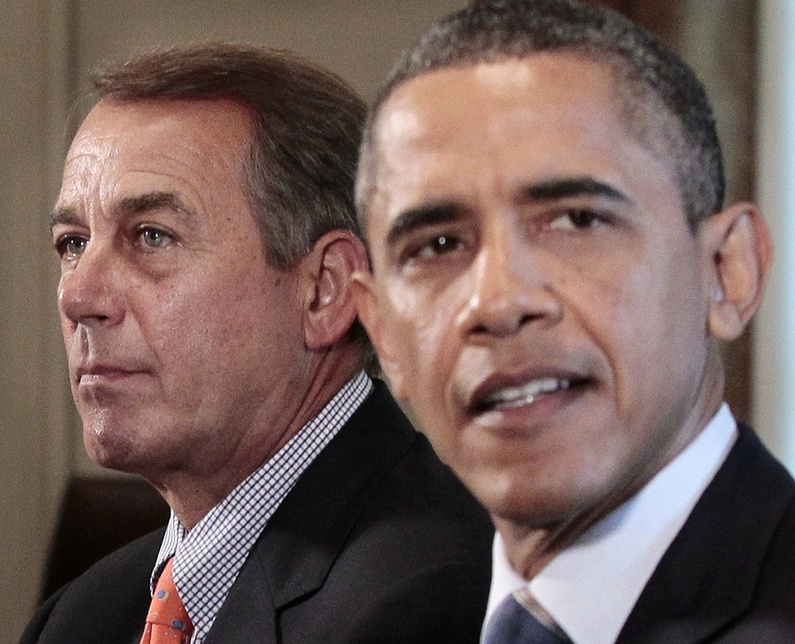Counselors working with couples often listen to their clients list their complaints about each other.
Then the counselor will point out to both parties that there is an underlying situation driving the dispute that neither one of them has brought into the open, though it is obvious to anyone listening to their points of view.
“You do know that this argument isn’t the issue,” the counselor says, noting that what the parties are fighting over isn’t what’s keeping them apart.
That is exactly what’s going on with the political fight in Washington over raising the federal debt ceiling by Aug. 2 to permit borrowing beyond the current $14.3 trillion limit.
The issue isn’t the debt ceiling. If anything is certain, sooner or later it will be raised, either by the deadline or not long after. Neither side wants to take the blame for precipitating the economic crisis that many experts say will ensue if the debt limit is not raised and the nation defaults on its financial obligations.
If the past is any guide, House Speaker John Boehner’s demands for spending reductions that are greater than the amount the debt ceiling is raised eventually will give way to Democratic resistance to that level of cuts. He’ll probably agree to some level of tax increases (which will probably be called “closing loopholes”) to offset whatever reductions occur.
A MUCH LARGER DEBATE
So when the two sides to the current dispute toss around “non-negotiable” demands” for one thing or another, remember that this is but one skirmish — and not a very significant one — in a much larger national debate over spending levels.
And that argument really is a debate over the proper size and appropriate role of government in many areas of life, including health care, retirement security, national defense and subsidies for corporations.
President Obama wants to be perceived as the “adult” in the argument, so he trots out phrases such as “if not now, when?” to foster the illusion that he is the only person who is willing to tackle the nation’s debt problem once and for all.
And yet the essence of his proposal for a “long-term” debt-reduction plan is raising taxes, a tactic that will serve no purpose beyond giving the government more money to spend on programs that will ultimately create bigger budget deficits and more debt.
Politicians and bureaucrats at every level of government, but especially the federal level, have demonstrated time and again that they simply cannot resist the urge to spend any dollar they get their hands on.
It is possible that at some point along the road to achieving fiscal sanity, it will make sense to consider ways to increase revenue. A tax increase with proceeds dedicated to debt reduction, for example, could be a useful weapon in the government’s anti-deficit arsenal — but not until a significant and sustainable economic recovery is under way. Our foundering economy simply cannot withstand the additional weight of higher taxes.
The president says he doesn’t want to “kick the can” down the road, but that’s exactly what he’s proposing. Raise the debt ceiling. Collect more taxes. Delay the hard choices. It’s what the government has been doing for decades and it’s the reason we’re in this mess.
NEEDED: AN ADULT IN THE FAMILY
If Obama wants to be the adult in our American family, he needs to tell the country the truth: The party’s over. The government can no longer afford to give people everything they want. Social programs once envisioned as a “safety net” for those in need have grown into “entitlements” that even those who can fend for themselves look to as a birthright.
Republicans, unfortunately, are artless when it comes to discussing such things so they leave themselves open to the charge that they are mean and coldhearted, that they don’t care about people who have become dependent on the government to fulfill their every need.
But even if that charge were true, there would be no disputing that congressional Republicans who are demanding budget cuts care about the future of the country. Their proposed solutions — slashing government spending in general and changing the cost and culture of entitlements in particular — are harsh, and certainly not perfect, but they address the real issue.
Remember, the real issue is not the debt-limit crisis, which in fact is much less a crisis than some would have us believe. Our nation will not default on its financial obligations, will not stop paying soldiers or paying Social Security benefits — not now, anyway.
That danger is real, but it looms in the future, when our profligate spending finally catches up with us; when we can no longer beg, borrow or print enough money to pay our bills.
That crisis, much more than the overhyped deadline for raising the debt limit, is the one the president and Congress need to address. They need to address the limits of government and the increasingly limited capacity of our economy to absorb the government’s excesses.
If they can’t, or won’t, then the American people will find a president and a Congress who will.
Send questions/comments to the editors.



Success. Please wait for the page to reload. If the page does not reload within 5 seconds, please refresh the page.
Enter your email and password to access comments.
Hi, to comment on stories you must . This profile is in addition to your subscription and website login.
Already have a commenting profile? .
Invalid username/password.
Please check your email to confirm and complete your registration.
Only subscribers are eligible to post comments. Please subscribe or login first for digital access. Here’s why.
Use the form below to reset your password. When you've submitted your account email, we will send an email with a reset code.